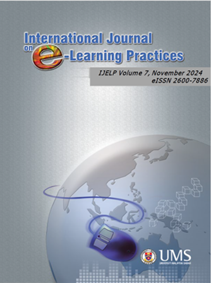COGNITIVE STYLES ON STUDENTS’ ACCEPTANCE OF ARTIFICIAL INTELLIGENCE-BASED TECHNOLOGY (CHATGPT AND KAHOOT!) FOR LANGUAGE LEARNING
DOI:
https://doi.org/10.51200/ijelp.v7i1.5352Keywords:
Artificial Intelligence, Education Technology, ChatGPT3.5, Kahoot!, Technology Acceptance, Cognitive Styles, Secondary EducationAbstract
The rapid technology evolution has grown other new branches in artificial intelligence particularly chatbots and self-generated output. In order to enhance teaching and learning experiences, the education sector has decided to espouse these advancements for teacher’s and student’s support. Despite the benefits these AI tools attempt to provide, the perceptions towards these technologies vary individually. Therefore, this study’s focal point is to determine the levels of AI-based technologies’ acceptance, specifically ChatGPT 3.5 and Kahoot among secondary school students at SMK Takis Papar. Additionally, this study seeks to identify the influence of Kirton’s Adaptive-Innovative cognitive styles on the process of decision-making regarding technology reception. Fifty students in Forms 1 and 3 at SMK Takis were given questionnaires as part of the data gathering process. In order to have a deeper understanding of secondary school students' opinions and preferences about ChatGPT and Kahoot integration in English language study, the responses were then analysed using SPSS version 28. By investigating the interconnection between cognitive styles and technology acceptance, this study attempts to propose valuable insights to policymakers, researchers, and educators involved in AI integration into secondary education settings.
References
Ahmad (2023). Impact of artificial intelligence on human loss in decision making, laziness and safety in education, Humanities and Social Sciences Communications, 10(311): 1-14. https://www.nature.com/articles/s41599-023-01787-8
Ali, J.K.M., Shamsan, M.A.A., Hezam, T.A., Majeed, A. (2023). Impact of ChatGPT in Learning Motivation: Teachers and Students’ Voices, Journal of English Studies in Arabia Felix, 2(1): 41-49. https://www.researchgate.net/publication/369062472_Impact_of_ChatGPT_on_Learning_Motivation_Teachers_and_Students'_Voices
Al-Tkhayneh (2023). The advantages and disadvantages of using artificial intelligence in education, Journal of Educational and Social Research 13(4):105-117. https://www.researchgate.net/publication/372180523_The_Advantages_and_Disadvantages_of_Using_Artificial_Intelligence_in_Education
Amadu, L., Muhammad, S.S., Mohammed, A.S., Owusu, G., & Lukman, S. (2018). Using Technology Acceptance Model to measure the use of social media for collaborative learning in Ghana, Journal of Technology and Science Education, 8(4): 321-336. https://files.eric.ed.gov/fulltext/EJ1186118.pdf
Ampong, K.O., Acheampong, B., & Kevor, M.O. (2023). Acceptance of Artificial Intelligence (ChatGPT) in education: trust, innovativeness and psychological need of students, Journal of Information & Knowledge Management 13(4):37-47. https://www.researchgate.net/publication/372787378_Acceptance_of_Artificial_Intelligence_ChatGPT_in_Education_Trust_Innovativeness_and_Psychological_Need_of_Students
Apuke, O.D. (2023). Quantitative research methods a synopsis approach, Kuwait Chapter of Arabian Journal of Business and Management Review 6(11):40-47. https://www.researchgate.net/publication/320346875_Quantitative_Research_Methods_A_Synopsis_Approach
Arifin, S., Setyosari, P., Sa’dijah, C., & Kuswandi, D. (2020). The effect of problem-based learning by cognitive style on critical thinking skills and students’ retention, Journal of Technology and Science Education, 10(2): 271-281. https://files.eric.ed.gov/fulltext/EJ1272819.pdf
Ashkanani, A.G.M. (2017). An investigation of the application of the Technology Acceptance Model (TAM) to evaluate instructors’ perspectives on e-learning at Kuwait University, [Doctoral dissertation, Kuwait University]. https://core.ac.uk/download/pdf/147609783.pdf
Atun, H. & Usta, E. (2019). The effects of programming education planned with TPACK framework on learning outcomes, Participatory Educational Research (PER), 6(2), pp. 26-36. https://files.eric.ed.gov/fulltext/EJ1236326.pdf
Bagozzi & Foxall (1995). Construct validity and generalizability of the Kirton Adaption–Innovation Inventory, European Journal of Personality, 9(3). https://journals.sagepub.com/doi/epdf/10.1002/per.2410090303
Bojorquez & Vega, (2023). The importance of Artificial Intelligence in education for all students, IDRA NEWSLETTER, 1(5): 1-7. https://files.eric.ed.gov/fulltext/ED628667.pdf
Bolodeoku, P.B., Igbinoba, E., Salau, P.O., Chukwudi, K.C., & Idia, S.E. (2022). Perceived usefulness of technology and multiple salient outcomes: the improbable case of oil and gas workers, Heliyon, 8(4):1-8. https://www.sciencedirect.com/science/article/pii/S2405844022006107
Burgess, G.L. & Worthington, A.K. (n.d.). Technology Acceptance Model, Persuasion Theory in Action: An Open Educational Resource, University of Alaska Anchorage. https://ua.pressbooks.pub/persuasiontheoryinaction/chapter/technology-acceptance-model
Burk, K. & Sival, D. A. (2018). Handbook and Clinical Neurology, Chapter 20 - Scales for the clinical evaluation of cerebellar disorders, 154: 329-339. https://doi.org/10.1016/B978-0-444-63956-1.00020-5
Byungura, J.C. (2019). Improving IT Integration for Higher Education Institutional Performance Towards a Contextualised IT-Institutional Alignment Model, [Doctoral dissertation, Stockholm University]. https://www.diva-portal.org/smash/get/diva2:1314620/FULLTEXT01.pdf
Cancino, M. & Ibarra, P. (2023). EFL secondary education teachers’ perceptions toward using Online Student Response






